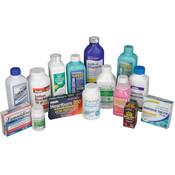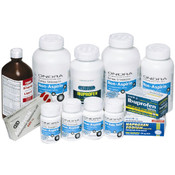The U.S. Food and Drug Administration today approved tranexamic acid (Lysteda tablets), the first non-hormonal product cleared to treat heavy menstrual bleeding (menorrhagia). Lysteda works by stabilizing a protein that helps blood to clot.
Heavy menstrual bleeding is reported each year by about 3 million U.S. women of reproductive age. Women with uterine fibroids may experience heavy menstrual periods. But in most cases, there is no underlying health condition associated with the condition.
“Menorrhagia can be incapacitating for some women,” said Kathleen Uhl, M.D., FDA’s associate commissioner of women’s health. “Heavy menstrual periods can cause pain, mood swings, and disruptions to work and family life.”
Tranexamic acid was first approved by the FDA in 1986 as an injection, under the brand name Cyklokapron (Pfizer), and is used to reduce or prevent bleeding during and following tooth extraction in patients with hemophilia, a hereditary bleeding disorder caused by the lack of a blood clotting factor.
The most common adverse reactions reported during clinical trials by patients using Lysteda included headache, sinus and nasal symptoms, back pain, abdominal pain, muscle and joint pain, muscle cramps, anemia, and fatigue. There was a statistically significant reduction in menstrual blood loss in women who received Lysteda, compared with those taking an inactive pill (placebo).
Use of tranexamic acid while taking hormonal contraceptives may increase the risk of blood clots, stroke, or heart attack, according to Scott Monroe, M.D., director of the Division of Reproductive and Urologic Products in the FDA’s Center for Drug Evaluation and Research. Women using hormonal contraception should take tranexamic acid only if there is a strong medical need, and if the benefit of treatment will outweigh the potential increased risk.
Tranexamic Acid (Lysteda) is manufactured by Xanodyne Pharmaceuticals of Newport, Ky, an integrated specialty pharmaceutical company with both development and commercial capabilities focused on pain management and women's healthcare. The company, founded in 2001 markets a portfolio of prescription pharmaceuticals and a line of prenatal vitamins.
Friday, November 13, 2009
Potential Health and Safery Concerns Results in FDA Probe of Caffeinated Alcoholic Beverages
The US Food and Drug Administration (FDA) today notified nearly 30 manufacturers of caffeinated alcoholic beverages that it intends to look into the safety and legality of their products.
“The increasing popularity of consumption of caffeinated alcoholic beverages by college students and reports of potential health and safety issues necessitates that we look seriously at the scientific evidence as soon as possible,” said Dr. Joshua Sharfstein, principal deputy commissioner of food and drugs.
Of the combined use of caffeine and alcohol among U.S. college students in the few studies on this topic, the prevalence was as high as 26 percent.
Under the Federal Food, Drug, and Cosmetic Act, a substance added intentionally to food (such as caffeine in alcoholic beverages) is deemed “unsafe” and is unlawful unless its particular use has been approved by FDA regulation, the substance is subject to a prior sanction, or the substance is Generally Recognized As Safe (GRAS). FDA has not approved the use of caffeine in alcoholic beverages and thus such beverages can be lawfully marketed only if their use is subject to a prior sanction or is GRAS. For a substance to be GRAS, there must be evidence of its safety at the levels used and a basis to conclude that this evidence is generally known and accepted by qualified experts.
The FDA alerted manufacturers to the fact that the agency is considering whether caffeine can lawfully be added to alcoholic beverages. The FDA noted that it is unaware of the basis upon which manufacturers may have concluded that the use of caffeine in alcoholic beverages is GRAS or prior sanctioned. To date, the FDA has only approved caffeine as an additive for use in soft drinks in concentrations of no greater than 200 parts per million. It has not approved caffeine for use at any level in alcoholic beverages.
The FDA requested that, within 30 days, the companies produce evidence of their rationale, with supporting data and information, for concluding that the use of caffeine in their product is GRAS or prior sanctioned. FDA's letter informed each company that if FDA determines that the use of caffeine in the firm's alcoholic beverages is not GRAS or prior sanctioned, FDA will take appropriate action to ensure that the products are removed from the marketplace.
In the past year, Anheuser-Busch and Miller agreed to discontinue their popular caffeinated alcoholic beverages, Tilt and Bud Extra and Sparks, and agreed to not produce any caffeinated alcoholic beverages in the future.
The federal agency with primary responsibility for regulating alcoholic beverages, the Treasury Department's Alcohol and Tobacco Tax and Trade Bureau, requires that alcoholic beverages contain only ingredients that satisfy FDA's requirements for use.
In late September, the FDA received a letter from 18 Attorneys General and one city attorney expressing concerns about caffeinated alcoholic beverages.
“The increasing popularity of consumption of caffeinated alcoholic beverages by college students and reports of potential health and safety issues necessitates that we look seriously at the scientific evidence as soon as possible,” said Dr. Joshua Sharfstein, principal deputy commissioner of food and drugs.
Of the combined use of caffeine and alcohol among U.S. college students in the few studies on this topic, the prevalence was as high as 26 percent.
Under the Federal Food, Drug, and Cosmetic Act, a substance added intentionally to food (such as caffeine in alcoholic beverages) is deemed “unsafe” and is unlawful unless its particular use has been approved by FDA regulation, the substance is subject to a prior sanction, or the substance is Generally Recognized As Safe (GRAS). FDA has not approved the use of caffeine in alcoholic beverages and thus such beverages can be lawfully marketed only if their use is subject to a prior sanction or is GRAS. For a substance to be GRAS, there must be evidence of its safety at the levels used and a basis to conclude that this evidence is generally known and accepted by qualified experts.
The FDA alerted manufacturers to the fact that the agency is considering whether caffeine can lawfully be added to alcoholic beverages. The FDA noted that it is unaware of the basis upon which manufacturers may have concluded that the use of caffeine in alcoholic beverages is GRAS or prior sanctioned. To date, the FDA has only approved caffeine as an additive for use in soft drinks in concentrations of no greater than 200 parts per million. It has not approved caffeine for use at any level in alcoholic beverages.
The FDA requested that, within 30 days, the companies produce evidence of their rationale, with supporting data and information, for concluding that the use of caffeine in their product is GRAS or prior sanctioned. FDA's letter informed each company that if FDA determines that the use of caffeine in the firm's alcoholic beverages is not GRAS or prior sanctioned, FDA will take appropriate action to ensure that the products are removed from the marketplace.
In the past year, Anheuser-Busch and Miller agreed to discontinue their popular caffeinated alcoholic beverages, Tilt and Bud Extra and Sparks, and agreed to not produce any caffeinated alcoholic beverages in the future.
The federal agency with primary responsibility for regulating alcoholic beverages, the Treasury Department's Alcohol and Tobacco Tax and Trade Bureau, requires that alcoholic beverages contain only ingredients that satisfy FDA's requirements for use.
In late September, the FDA received a letter from 18 Attorneys General and one city attorney expressing concerns about caffeinated alcoholic beverages.
Subscribe to:
Comments (Atom)






